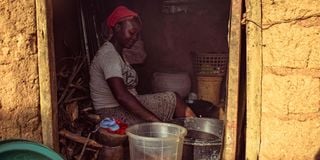How unpaid care work hinders women's development in Kajiado

Providing and receiving quality and adequate care is critical for human well-being and the functioning of our societies and economy.
When Jane* from Oloitoktok dropped out of school to deliver her child, she hoped that she would go back and complete her studies soon after.
But it was not to be the case.
“I am a young mother and married as a third wife. I cannot resume school because there is no one to take care of my baby. I dropped out of school in class five and as the youngest wife, I have to take my household responsibilities seriously. When the chief came here insisting that I go back to school, I told her that I was in no position to resume as this would mean abandoning my baby which would lead to stigmatisation and isolation by my family.”
Jane is one of the respondents that White Ribbon Alliance- Kenya spoke to recently, as they documented unpaid care and domestic work among women from pastoralist communities with a focus on Kajiado County.
The study sheds light on the often-overlooked role of Unpaid Care and Domestic Work (UCDW).
UCDW includes all non-market, unpaid activities carried out in households – including both direct care of persons, such as looking after children or elderly people, and indirect care, such as cooking, cleaning, or fetching water.
Providing and receiving quality and adequate care is critical for human well-being and the functioning of our societies and economy.
Disproportionate burden borne by women
The findings underscore the disproportionate burden borne by women and girls in the realm of care work, significantly impacting their well-being, economic opportunities, and societal participation.
The majority of the respondents mentioned that most time was spent fetching water, followed by caring for children, elderly, and sick people in the household- this is throughout the day until they sleep or go to school for school-going children.
Fuel collection, cleaning the house, mending, and ironing are mostly done in the afternoons.
The study further reveals that in addition to doing domestic work, women have minimal time for leisure and are expected to be taking care of others.
This has greatly affected how women access and utilise healthcare services.
Medical emergency
The majority of women (54 per cent) unlike men at 40 per cent agreed that women are supposed to be taking care of people, so unless there is a medical emergency women admitted that voluntary health care is almost a dream.
“You will rarely find a Maasai woman walking into a health facility to seek medical care more so reproductive health services or antenatal/postnatal care or minor ailments like headache, backache et al, because she is expected to be taking care of others but not herself. The county and other well-wishers have constructed and equipped health facilities with services that are barely utilised because women don’t have time for these. Mostly because it is not culturally valued like the caring role at home,” confides Mary, a resident from Isinya.
Domestic work has also affected literacy levels among women, impeding their chances of getting paid work.
According to Grace, a female education and gender officer at Kajiado County, confirms this.
“Most of our women are illiterate and therefore unable to access income through paid jobs. This is a problem that we have been grappling with for years despite Kajiado being a host to key industries.”
As per focused group discussions (FGDs), while women are tasked with the responsibility of taking care of the livestock, men sell and benefit from the proceeds.
Key findings from the study highlight the pervasive nature of care work in Kajiado County and the rest of the country, with women emerging as the primary caregivers.
Far-reaching implications for women
The disproportionate burden of care work has far-reaching implications for women.
Not only does it impact their physical and mental health, but it also limits their economic independence and restricts their participation in community and political life.
Further, the undervaluation of care work in policy and economic discussions exacerbates the lack of support and recognition for caregivers.
The study calls for policy and legislative support to enact measures recognising UCDW and integrating it into national statistics and economic planning.
Additionally, infrastructure development is deemed essential to improve access to essential services and reduce household care burdens.
Social protection measures, including financial assistance for caregivers, are also recommended to alleviate the economic strain associated with care work.
There’s also a need for awareness and education campaigns to shift perceptions about care work and promote gender equality in care responsibilities.
Lastly, community and institutional support programs are proposed to reduce the workload on caregivers and acknowledge their invaluable contributions to society.
In conclusion, recognising and fairly distributing care work is crucial for achieving gender equality and fostering the well-being of communities.
The report suggests a collective effort from governments, communities, and individuals to transform the landscape of care work, ensuring it is valued and supported.





